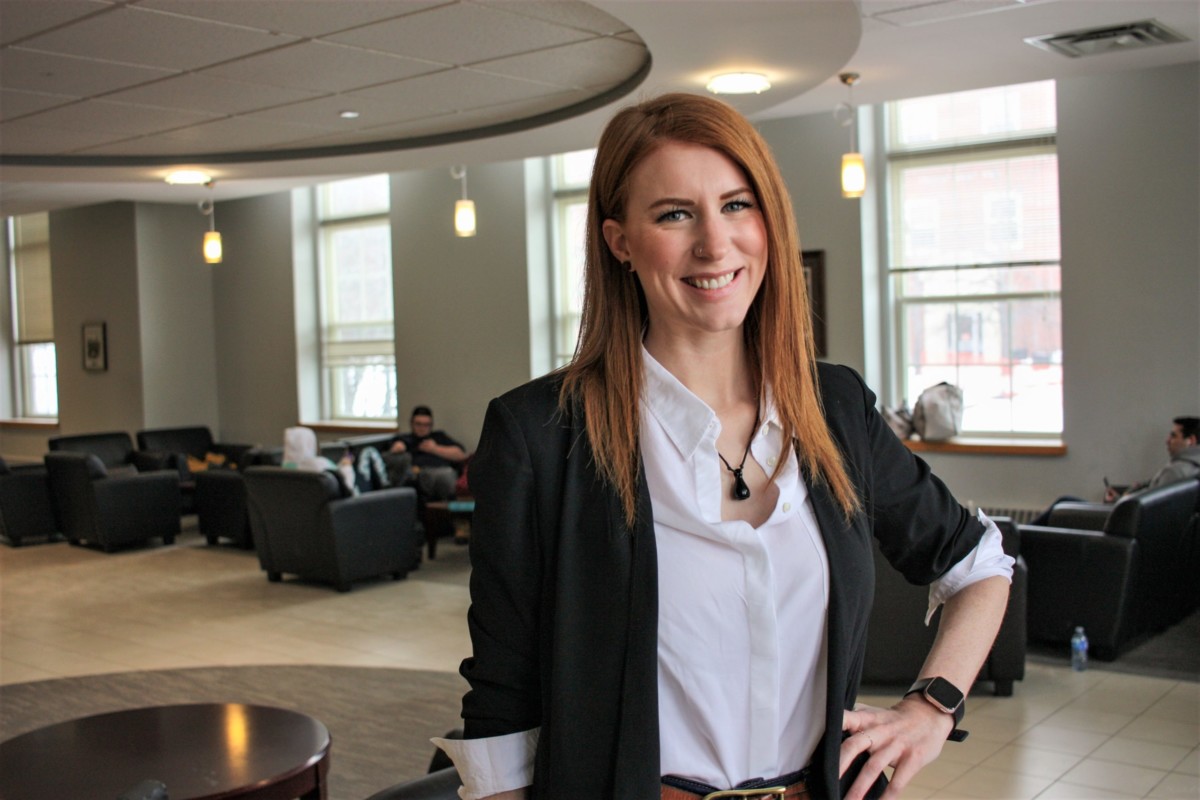Cassidy Wilson, the new campus LGBTQIA2s+ Wellness Coordinator, hopes to make it easier for folks on campus to “just be themselves.”
“I feel like there’s a lot that has been done to promote rights for LGBTQ+ folks, but there’s a lot more that needs to happen. And I can’t think of something else that I would want to do with my time than do something impactful and meaningful for this community,” said Wilson.
Wilson, 32, started her masters in Alberta before she decided she wanted to pursue a PhD. She applied to the University of New Brunswick to do their thesis-based master’s in counselling and moved her life and education across the country. To her, it seemed like the most spontaneous choice to come to Fredericton.
“I just felt really drawn to the East Coast. I had spent my life living in the dry prairies, and I was just like, why not?” said Wilson. “I’m young, I can do it. Why wouldn’t I move across the country?”
She will work with students from the University of New Brunswick, New Brunswick Community College and STU.
Wilson’s role, funded by the Department of Post-Secondary Education, Training and Labour, is designed to provide four main supports to queer and trans students: counselling and advising, educating faculty and staff, community building and policy advising.
She will work with students from the University of New Brunswick, New Brunswick Community College and STU. Wilson will also be working with student groups on campus like the Sexuality and Gender Advocacy (SAGA) and The 203 Centre for Gender and Sexual Diversity.
A needed support
STU professor Erin Fredericks was the LGBTQ+ resource advisor on campus prior to the creation of this position. Brock Richardson, the director student services and residence life, said over time, queer and trans students who were struggling at STU went to Fredericks for help with issues varying from course selection to how to get hormone therapy in Fredericton.
Fredericks was a full-time professor at the time they took on this role. Richardson said while the job was recognized by STU, it wasn’t an official position.
“It just became really clear that this isn’t something that we should have a professor doing off the side of their desk. We need this kind of a support more for students,” said Richardson.
Richardson said the key difference between Fredericks’ position and the new LGBTQIA2s+ Wellness Coordinator position, is the addition of counselling to the guidance and education Fredericks was already doing.
Richardson said last year, STU participated in the National College Health Assessment Survey to get a sense of mental health on campus. In this survey, Richardson said 29.6 per cent of STU students identified as a gender minority. In comparison, he said the national average is 17 per cent.
“And we also know that people who are part of that community … that students who identify as gender sexual minorities are facing higher struggles with mental health.”
He also said they experience issues at a greater rate than the rest of the population who are in the same age group.
“So we know that their needs are really important to their well being and their ultimate success in school.”
One-of-a-kind
Richardson said they’re not aware of any other position in Canada like STU’s LGBTQIA2s+ Wellness Coordinator. Many schools have pride centres that focus on a university policy level, he said, but STU’s position is more focused on the student level. It aims to give support to students and grow to influence policy.
“Ideally, those pieces that work over time hopefully means that our institutions are more open and more accessible, and the gap in mental health between queer and trans students and other students isn’t as much as it is now. But we know it’s going to take some work to get there.”
The power to change
Wilson said she has a lot of power in her position as a white, cis female.
“And inherently in there, there is power to be able to make some change, where a lot of queer and trans students don’t have the same power.”
Wilson said queer and trans folks in general are at increased risk when it comes to violence, discrimination, stereotyping and mental health issues. And while there’s a lot that’s been done to promote the rights for LGBTQ+ folks, she said, there’s still more to do.
Over the next month, Wilson said she will meet with with the student body and community members to see what changes they’re wanting to see. Wilson called this the “listening phase.”
She said she’s excited to make change in this role.
“My approach to this role isn’t coming in and saying, ‘This is what I think needs to change.’ My approach is to basically consult with members of the community and see what they want to change, and from there have a conversation where together we can pick like the top three that we want to advocate to change and then I can do my best to do that.”

